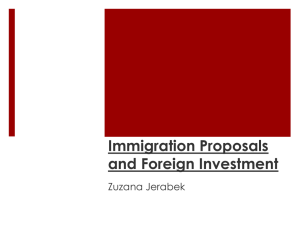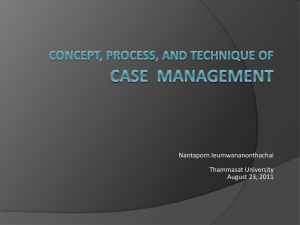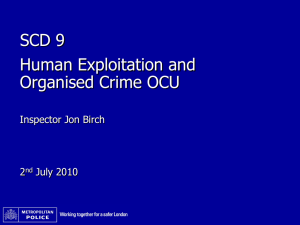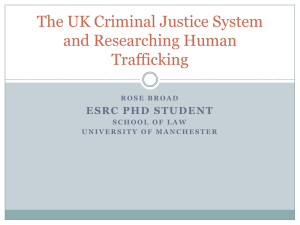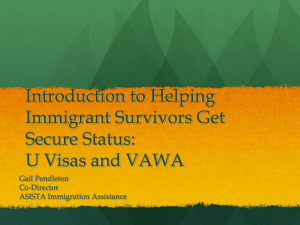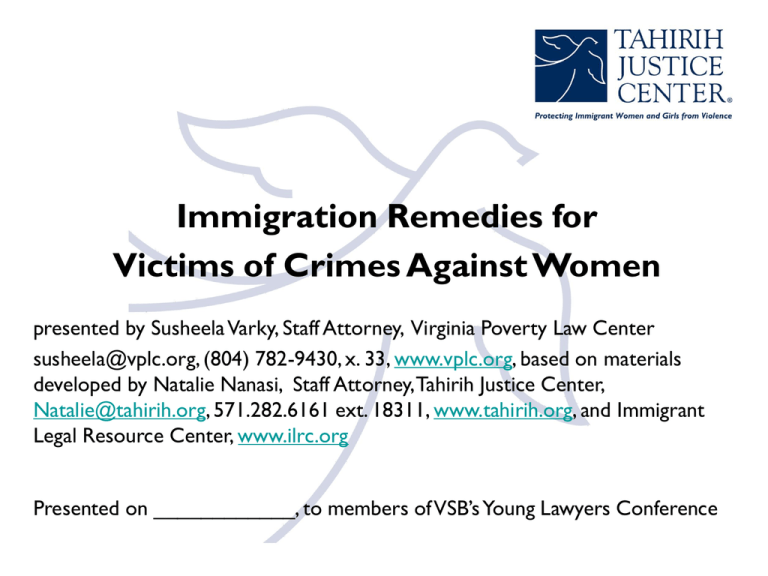
Immigration Remedies for
Victims of Crimes Against Women
presented by Susheela Varky, Staff Attorney, Virginia Poverty Law Center
susheela@vplc.org, (804) 782-9430, x. 33, www.vplc.org, based on materials
developed by Natalie Nanasi, Staff Attorney, Tahirih Justice Center,
Natalie@tahirih.org, 571.282.6161 ext. 18311, www.tahirih.org, and Immigrant
Legal Resource Center, www.ilrc.org
Presented on ____________, to members of VSB’s Young Lawyers Conference
AGENDA
• A few immigration basics
• Violence Against Women Act (VAWA) Self-Petitions and Battered
Spouse Waivers – for spouses of abusive U.S. citizens or Permanent
Residents
• The U visa – for victims of violent crimes such as domestic violence,
rape, and sexual assault
• The T visa – for survivors of human trafficking, including sex
trafficking and labor trafficking
• Gender-based asylum – for women fleeing persecution such as
domestic violence, honor crimes, FGM/C, widow rituals, forced
marriage
2
What agencies make up Immigration?
• Department of Homeland
Security
– US Citizenship &
Immigration Service
(USCIS)
– US Immigration & Customs
Enforcement (USICE)
– US Customs & Border
Patrol (USCBP)
• Department of Justice
– Executive Office for
Immigration Review (EOIR)
– Board of Immigration
Appeals (BIA)
• Federal Circuit Courts of
Appeals
3
Immigration Basics: Immigrants v. Nonimmigrants
Immigrants:
Lawful Permanent Residents (LPRs) may permanently reside in
the US and legally work in the US
Common ways to obtain permanent residency:
– Family-sponsored immigrants
– Employment-based immigrants
– Diversity Immigrants
– Refugees and Asylees
4
Immigration Basics (continued)
Nonimmigrants
Nonimmigrant status = temporary period of time.
Because they are restricted to the activity consistent with
their nonimmigrant category, the most significant issue is
whether the person may lawfully work in the US.
Obtained at a US Consulate abroad or within the US by
asking the USCIS for a “change of status” from one
nonimmigrant category to another.
5
Immigration Basics (continued)
Nonimmigrant Status Categories (e.g.)
Temporary Visitors (B-2 visa)
Academic Students (F-1 visa)
Temporary Workers (H-1B visa)
Fiancée/Fiancé of U.S. Citizen (K-1 visa)
6
VAWA Self-Petitions
and
Battered Spouse Waivers
7
Elements of VAWA
– Identity of the Petitioner
– Evidence of the Abuser’s Legal Status in the United States (U.S. Citizen
or Lawful Permanent Resident)
– Evidence that the Petitioner and Abuser Married in Good Faith
– Evidence that the Petitioner and Abuser Shared Residence
– Evidence of Physical, Mental and/or Sexual Abuse
– Evidence of Good Moral Character of the Petitioner
8
“Any Credible Evidence”
Identity
• Passport
• Driver’s License
Abuser’s Legal Status
• Copy of Green Card, naturalization certificate or U.S. birth
certificate
Good Faith Marriage
• Marriage Certificate
• Photographs (wedding pictures)
• Letters, cards and emails
• Birth Certificates of their children
• Copies of any immigration petitions/applications filed on her behalf
9
Evidence, Continued
Shared Residence
• Bills with both names
• Joint leases or rent receipts
• Joint Tax Returns or bank account statements
• Any court or legal documents regarding their relationship
Abuse
• Any police records or reports
• Medical records as evidence of physical abuse
• Photographs of injuries
• Protective Order paperwork
• Supporting letters, affidavits or declarations from witnesses,
counselors, therapists, shelter workers, counselors, social workers, victim
witness advocates, friends, relatives, clergy
10
Benefits of an Approved VAWA
• Employment Authorization Document (“work permit”)
• A VAWA Self-Petition is not an application for Permanent
Resident Status (i.e. an application for a “Green Card”)
• An approved VAWA self-petition allows the applicant to either
apply for permanent residency in the U.S. or at a U.S.
Consulate/Embassy abroad.
• If the applicant is/was married to a USC, then she can file for
permanent residency and for a work permit at the same time
she files her VAWA Self-Petition.
11
Battered Spouse Waivers: What
is Conditional Residency?
• Conditional permanent residency is given to individuals who have
obtained their permanent residency through their marriage to a U.S.
Citizen or Lawful Permanent Resident spouse, if the marriage is less
than two years old.
• Conditional permanent residency expires after two years.
• Prior to expiration, the conditional resident and her spouse must
jointly submit a petition to have the conditions removed from the
permanent residency.
o Purpose - deter marriage fraud
12
Battered Spouse Waivers:
Removal of Conditions
To qualify for a waiver of the joint filing requirement because of
domestic violence, the conditional resident must demonstrate that:
she entered the marriage in good faith, but she or her child was
subject to battery or extreme cruelty by the spouse/parent.
The result of an approved waiver or a jointly filed application is the
issuance of a permanent (or unconditional) green card.
13
The U Visa:
Helping Immigrant Victims of Crime
14
Background/Policy
• Congress created the U Visa in an effort to strengthen the ability of
law enforcement agencies to detect, investigate and prosecute crimes
against immigrants.
– Recognition of importance of victim & witness cooperation
– Recognition that immigration status affects likelihood of cooperation
• Created as part of the Victims of Trafficking and Violence Prevention Act of
2000
– Regulations not issued until September 16, 2007 (seven years later!)
– Interim rule in effect as of October 16, 2007
– Comments due on November 16, 2007 and final rule to be promulgated
thereafter.
15
Elements of the U Visa
• The applicant has suffered substantial physical or mental abuse as
a result of having been a victim of certain criminal activity
• The applicant possesses information concerning that certain
criminal activity
• The applicant has been helpful, is being helpful, or is likely to be
helpful to law enforcement official
• The criminal activity described violated the laws of the United
States or occurred in the United States.
16
“Certain Criminal Activity”
One or more of the following or any similar activity in violation of Federal,
State, or local criminal law:
•
•
•
•
•
•
•
Sexual assault or abusive sexual contact
Rape
Domestic violence
Felonious assault
Kidnapping or Abduction
False imprisonment or unlawful criminal restraint
Other eligible crimes include trafficking, manslaughter, murder, torture,
prostitution, female genital mutilation, being held hostage, blackmail,
peonage, involuntary servitude, slave trade, extortion, witness tampering,
obstruction of justice, and perjury
* Attempt, conspiracy, or solicitation to commit any of the above
17
Defining a Victim
Direct victim
• Direct and proximate harm
• Bystanders who suffer unusually direct injury
Indirect victim
• Certain family members if direct victim is deceased due
to murder or manslaughter, or incapacitated or
incompetent
* Grey area - minor U.S. citizen child victim with
undocumented parents
18
Substantial Abuse
• The abuse can be either physical or mental
• Factors to be considered include:
–
–
–
–
–
The nature of the injury inflicted or suffered
The severity of the perpetrator’s conduct
The severity of the harm suffered
The duration of the infliction of the harm
The extent to which there is permanent or serious harm to the
appearance, health, or physical or mental soundness of the victim
• No single factor is a prerequisite, case-by-case determination
19
Helpfulness
• The U Visa is available to those who are “helpful” regardless of
whether the investigation or prosecution results in a conviction.
• Ongoing responsibility to cooperate
• Certifying official can withdraw certification
• DHS can contact certifying official
• A parent or guardian can fulfill the cooperation requirement for
incompetent or incapacitated victims, or victims under 16 at the
time of criminal activity
20
Law Enforcement Certification
• Law Enforcement Certification Form (I-918, Supp B) can be signed
by:
– “Traditional law enforcement agencies” such as police or prosecutors
– Judges
– Other agencies that have criminal investigative jurisdiction in their
respective areas of expertise, such as Child Protective Services, Equal
Employment Opportunity Commission, or Department of Labor.
• Must be signed by either the head of the agency or an
individual specifically designated by the head of the agency.
• Expires six months after date of signature.
21
Evidence
• Evidence of Crime / Victim’s Helpfulness
–Police report
–Arrest warrant
–Court disposition
–Protective Order, if applicable
–Crime as described in state or federal code
• Evidence of Abuse
–Medical Records
–Photographs
–Supporting letters, affidavits or declarations from witnesses, counselors,
therapists, shelter workers, counselors, social workers, victim witness advocates,
friends, relatives, clergy
“Any Credible Evidence Standard”
22
Benefits of the U Visa
• Lawful U status for four years for principal applicant
• Employment Authorization for 4 years
– Derivatives must file I-765 after the U Visa is approved to
obtain EAD.
• Can petition for derivatives (I-918 Supplement A)
– For applicants under 21: victim’s spouse, children, parents and
unmarried siblings < 18 years
– For applicants 21 or older: victim’s spouse, children
• Can apply to adjust status to LPR after three years
23
The T Visa:
Helping Victims of Trafficking
24
Elements of the T Visa
• A victim of a severe form of trafficking;
• Physically present in the U.S. on account of the trafficking;
• Complied with any reasonable request for assistance in the
investigation and prosecution of acts of trafficking; and
• Would suffer extreme hardship involving unusual and severe
harm upon removal.
25
Severe Form of Trafficking
Sex trafficking
– a person is induced to perform a commercial sex act
by force, fraud, or coercion; or
– a person under the age of 18 is induced to perform a
commercial sex act;
Labor/services trafficking
(1) recruitment, harboring, transportation, provision, or
obtaining of a person for labor or services
(2) through the use of force, fraud, or coercion
(3) for the purpose of subjection to involuntary servitude,
peonage, debt bondage, or slavery
26
Physically Present
• Applicant must be present in the U.S.
• Presence must be on account of the trafficking
• Presence must be continuous (or exit/reentry must
also be related to trafficking)
• No clear chance to leave
– If applicant escaped traffickers before law enforcement
involvement, s/he must show that s/he did not have a clear
chance to leave the U.S.
27
Assisted Law Enforcement
• Primary evidence:
– I-914B, Law Enforcement Certification (DOJ, FBI, ICE, etc.)
– Continuous Presence (temporary form of relief requested by law
enforcement that allows victim to remain in US to testify against trafficker)
• Secondary evidence:
– Letters or other correspondence detailing efforts to obtain I-914B or
client’s cooperation with federal law enforcement;
– I-914B signed by local law enforcement;
– Letters from local enforcement
• If applicant is under 18, s/he is exempt from this requirement
• Success of investigation and/or prosecution does not effect
eligibility
28
Extreme Hardship
Factors:
•
•
•
•
•
Age, circumstances;
Need for, and access to, physical and mental health care;
Access to U.S. courts to redress acts of trafficking;
Access to support services or lack of services in home country;
Likelihood of revictimization in home country and authorities’ ability to
protect;
• Likelihood that culture/social practices would penalize victim of trafficking;
• Likelihood that trafficker or associates would retaliate; or
• Risk to safety caused by civil unrest or armed conflict.
Notes:
• Hardship should not be based on economic harm/ opportunity.
• VSC has not yet denied a T-visa based on failure to show extreme hardship
(ILRC, 2006).
29
Benefits of the T Visa
• Lawful T status for four years for principal applicant
• Employment Authorization for 4 years
– Derivatives must file I-765 after the T Visa is approved to obtain EAD.
• Can petition for derivatives (I-914 Supplement A)
– For applicants under 21: victim’s spouse, children, parents and unmarried
siblings < 18 years
– For applicants 21 or older: victim’s spouse, children
• Can apply to adjust status to LPR after three years or close of investigation
• Eligible for same public benefits as a refugee:
– Survivors over 18 require certification from the Office of Refugee
Resettlement;
– Survivors under 18 are immediately eligible for benefits.
30
Gender-Based Asylum
31
Asylum may be granted to applicants who are defined
as refugees under the Immigration and Nationality Act:
“any person who is outside any country of such person’s
nationality . . . and who is unable or unwilling to avail
himself or herself of the protection of that country
because of [past] persecution or a well-founded fear of
[future] persecution on account of race, religion,
nationality, membership in a particular social group, or
political opinion.”
32
On Account Of …
• Race
• Religion
• Nationality
• Political Opinion (actual or imputed)
• Membership in a Particular Social Group
33
Membership in a Particular
Social Group
• Common, immutable characteristic
• Members of the group cannot change, or
should not be required to change, this
characteristic because it is fundamental to
their identity or conscience
• Female Genital Mutilation, Honor Crimes,
Forced Marriage
34
Alternative Asylum Grounds
• The applicant’s actual or imputed political opinion that
she is a woman who believes that wives should be able
to lead their lives without being dominated by their
husbands;
• The applicant’s religious beliefs that differ from her
husband’s religious beliefs concerning the proper role of
women in society;
• The applicant’s membership in a particular social group
of women who challenge their husband’s domination.
35

